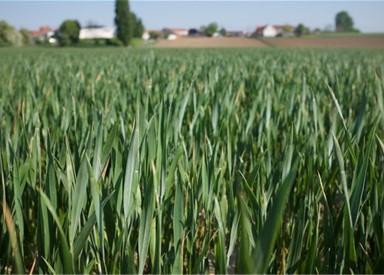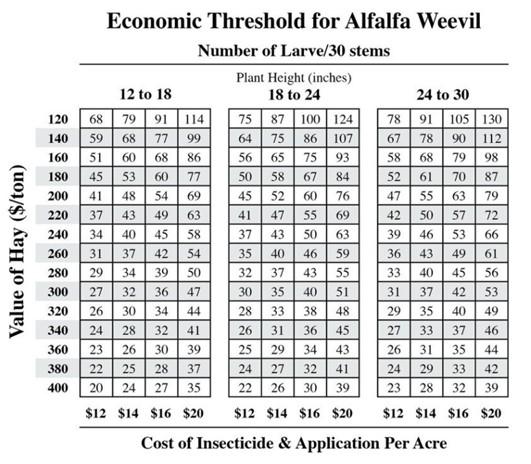April IPM Insect Scouting Tips
Alfalfa
Alfalfa weevils emerge and lay eggs in alfalfa stems in Mid-April. The larvae are yellowish-green with blackheads. The easiest way to scout for this pest is to randomly collect 30 stems from the field and shake them into a bucket. The economic threshold for alfalfa weevil is determined based on the height of plants, the value of the forage, and the cost of insecticidal treatment. A threshold chart can be found on the PennState Extension website https://extension.psu.edu/alfalfa-weevil (Figure 1).
Small Grain
Cereal leaf beetle adults become active in Maryland around mid-April. Adults will lay eggs and larvae will start feeding around the end of the month. Scouting should be done away from the field edge since they tend to clump in fields and near edges. Check tillers of 50-60 randomly selected plants per field and count the number of eggs and larvae. The economic threshold is reached when there is an average of one or more larvae on 25% of tillers. The populations can be spotty, so checking individual fields is often necessary.
Several species of aphids will start to appear in small grains and other spring crops in April, depending on the weather. The most common species in our area are English grain aphid, bird cherry-oat aphid, corn leaf aphid, and the greenbug. Springtime feeding damage can cause discoloration on the leaves and shriveled heads. To scout for aphids, examine one linear row-foot at ten sites within the field. The economic threshold for aphids in wheat in pre-heading stages varies based on the aphid species present. Still, the general rule is treatment is recommended if there is an average of 150 aphids per linear foot of row, with no natural enemies present. For information about species identification and thresholds, check out the “Early Aphid Occurrences: a Possible Result of Warmer Winter Temperatures” article on the Maryland Agronomy News Blog, or contact your local Extension agent.

